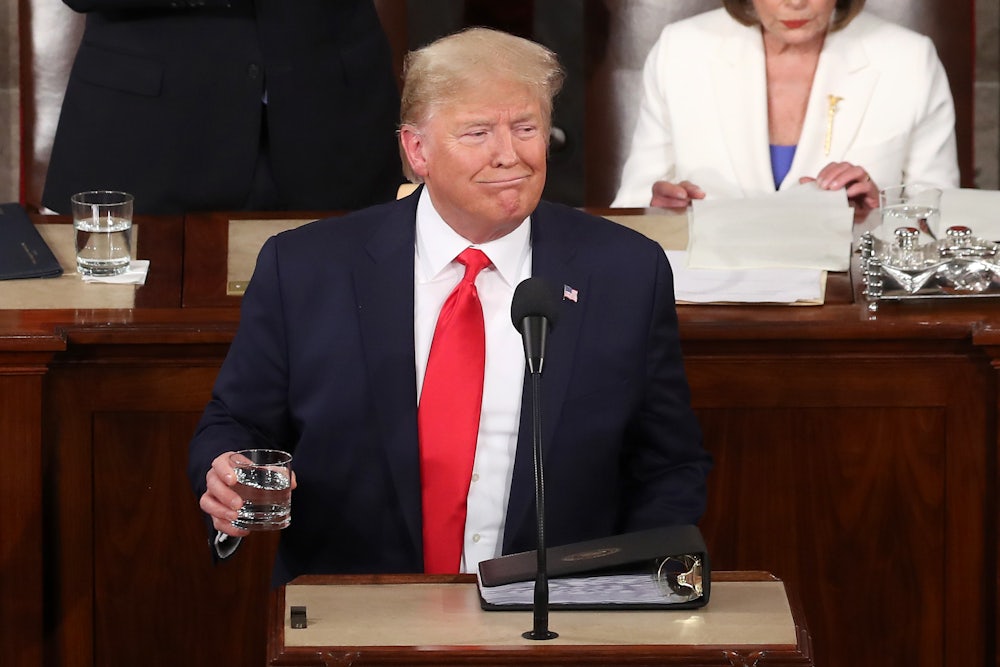Roughly 24 hours ago, Democrats around the country were informed that the Iowa Democratic Party, after years of organization and effort from the Democratic candidates and their campaigns, would not be delivering results from the first-in-the-nation Iowa caucuses. The outcome of the contest remains unresolved at the time of this writing, and the debacle has thrown the future of the caucuses, as well as the course of the primary to come, into question. In a matter of hours, Donald Trump, the third president in our history to have been impeached, will be acquitted by a Republican Senate after a trial that introduced no witnesses or evidence and examined only a narrow sliver of Trump’s alleged abuses of office.
All told, Tuesday could not have been a more favorable night for the last State of the Union of Trump’s term. Many speculated, in the hours leading up to the speech, that gloating about impeachment and Iowa would pepper his remarks. The speech, however, mentioned neither. Instead, it just about mirrored Trump’s past addresses, with the exception of a few buzzy moments—Limbaugh’s feigned surprise at being given the Medal of Freedom, a deployed soldier’s reunion with his family, Nancy Pelosi’s impromptu ripping of the speech’s pages—that will likely pass from memory within a week. The sections of his remarks likeliest to stick are the ones he’s likeliest to reprise as this year’s election gets underway.
While the events of the week’s news cycle didn’t make it into the text, Trump did opt to take a victory lap on the economy—the first half of the speech was a rote recitation of massaged, manipulated, and outright invented statistics about the growth his administration did little to bring about. This was accompanied by still more brazen dishonesty about the right’s dedication to protecting Medicare and Social Security. Their attacks on the safety net—including the Trump administration’s efforts to cut Social Security benefits for the disabled—ought to figure largely in the messaging the eventual Democratic nominee takes into the general election. Trump cannot ride comfortably on economic performance alone, especially given that the outlook might darken in the months ahead, and the Republican vulnerability on entitlements was among the factors that made Trump’s populist heterodoxy during the 2016 election so compelling to so many.
Trump, aware of this, is still trying to put on an empathetic front on health care. At one point during the speech, Trump laughably cast himself as a defender of protections for those with preexisting conditions to a standing ovation from Republicans. But the instincts that led him to suggest he supported public insurance during the Republican primary in 2015 have been suppressed and supplanted by scaremongering about socialism on the march. “As we work to improve Americans’ health care, there are those who want to take away your health care, take away your doctor, and abolish private insurance entirely,” he said. “One hundred thirty-two lawmakers in this room have endorsed legislation to impose a socialist takeover of our health care system, wiping out the private health insurance plans of 180 million Americans. To those watching at home tonight, I want you to know: We will never let socialism destroy American health care!”
The terrifying specter of “free taxpayer-funded health care to millions of illegal aliens” was also raised. “These proposals would raid the Medicare benefits our seniors depend on, while acting as a powerful lure for illegal immigration,” he said. “This is what is happening in California and other states—their systems are totally out of control, costing taxpayers vast and unaffordable amounts of money.”
Through it all, Trump refrained from referencing any of the Democratic Party’s socialists by name—no doubt partly because the right is comfortable with red-baiting as a strategy against the Democratic Party as a whole. The broad brushes satisfy the base. During his State of the Union addresses, Obama spent considerable time trying to win over skeptics and critics with paeans to bipartisanship and centrist messaging on issues such as the deficit and national security. Trump, by contrast, uses these addresses to get the blood of his supporters flowing—and he often does it with invocations of blood.
True to form, he wound down his speech Tuesday night with grisly descriptions of crimes allegedly committed by the undocumented, including killings blamed on sanctuary city policies. “Just 29 days ago, a criminal alien freed by the sanctuary city of New York was charged with the brutal rape and murder of a 92-year-old woman,” he said. “The killer had been previously arrested for assault, but under New York’s sanctuary policies, he was set free. If the city had honored ICE’s detainer request, his victim would be alive today.”
Blunt xenophobia didn’t deliver for Republicans in the 2018 midterms, and it’s doubtful that it will in this year’s election. But Trump and other Republican candidates are sure to give it another go anyway. Whether they succeed in spite of themselves depends in part on whether the Democratic Party settles on a nominee willing to take a rhetorical approach against this president more compelling to the average voter than the viral GIFs and clap backs that now inevitably accompany these speeches. As it stands, chances are about even that we’ll see Trump at the dais again next year, with considerably more to gloat about.
